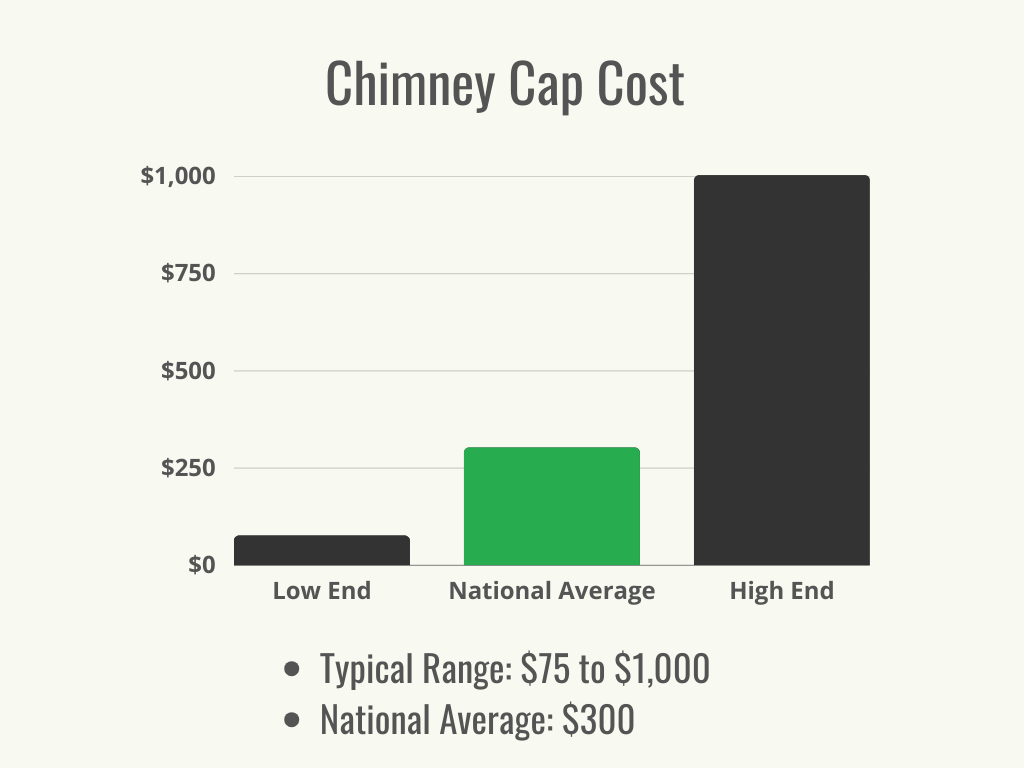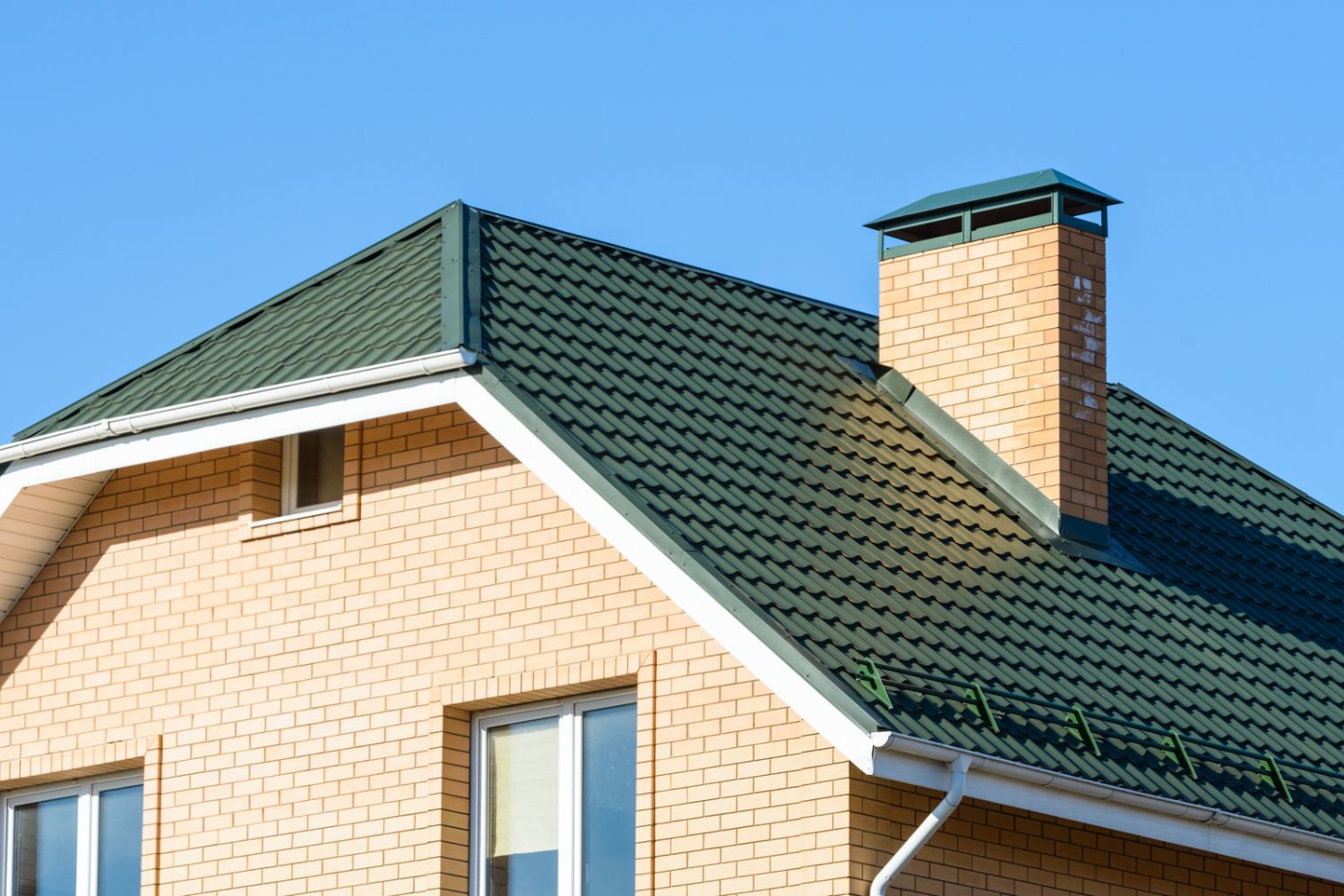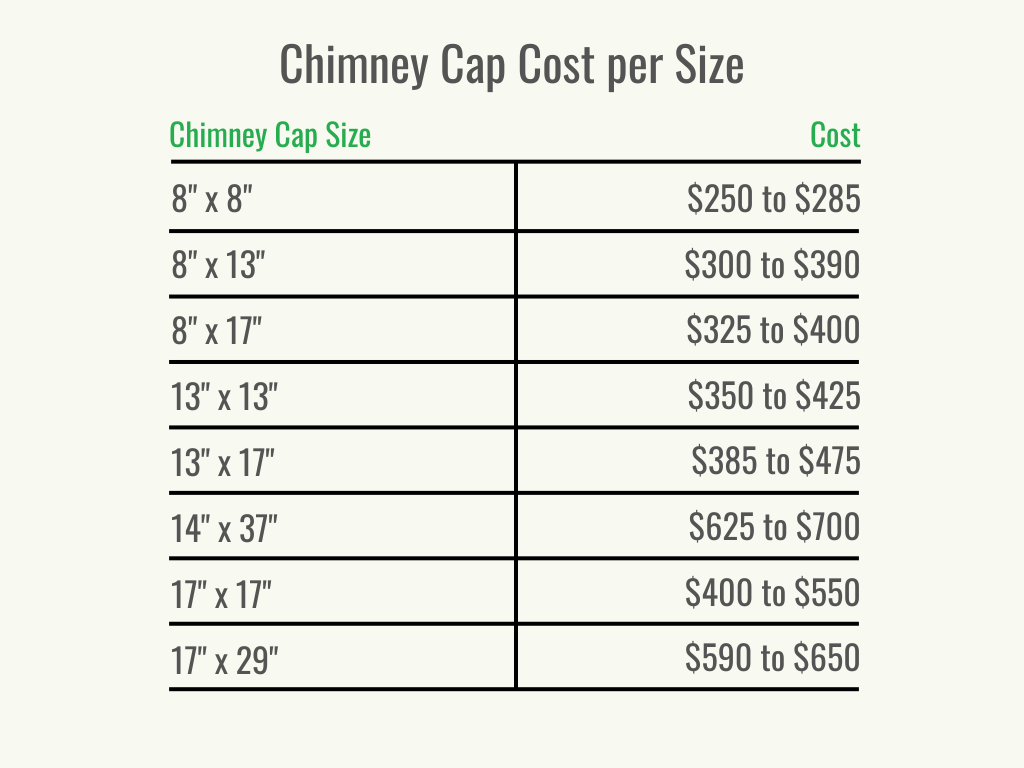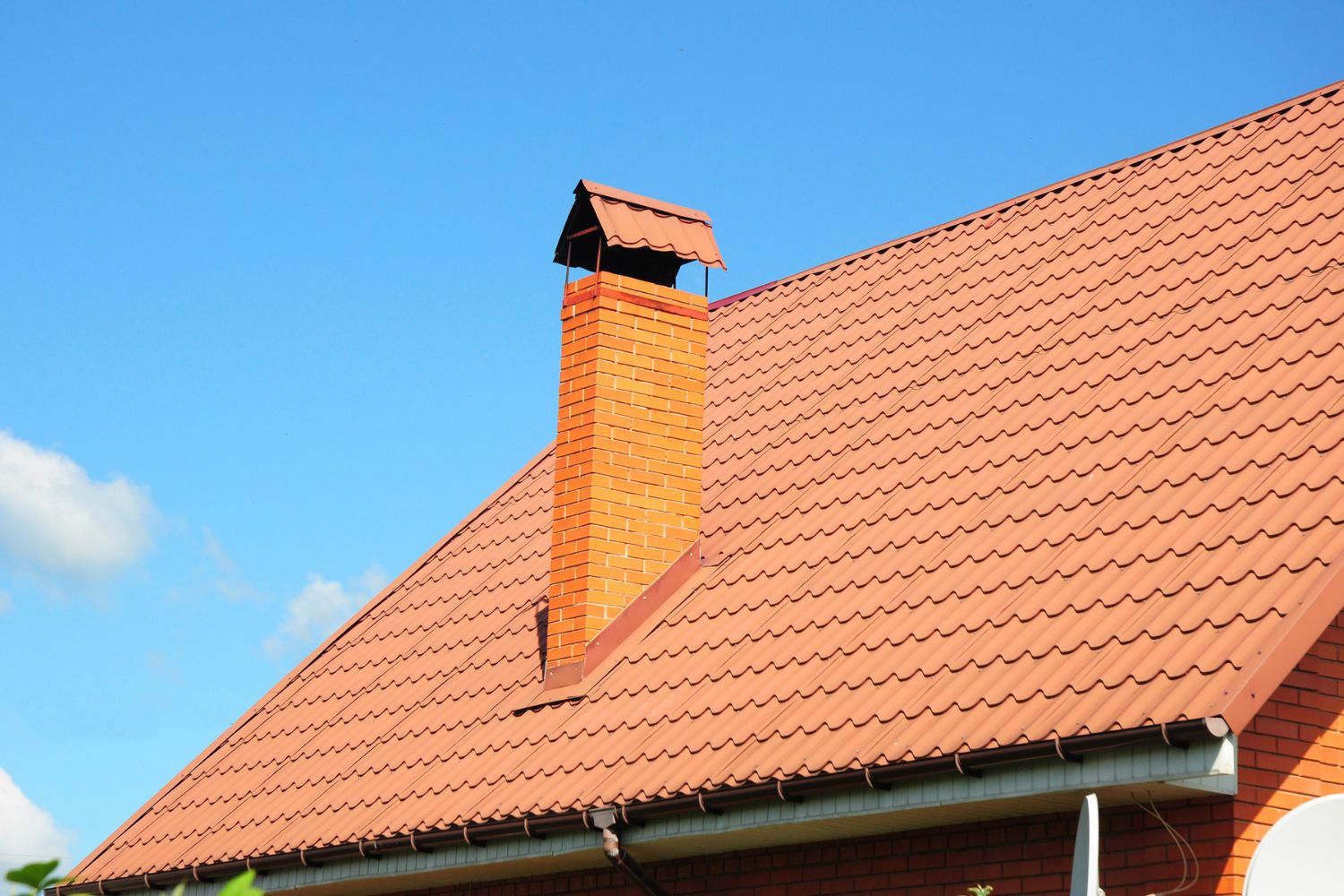

We may earn revenue from the products available on this page and participate in affiliate programs. Learn More ›
Highlights
- The typical range for chimney cap costs is $75 to $1,000 with a national average of $300.
- Cost factors for chimney cap installation can include material, size, shape, type, labor, and seasonality.
- Chimney caps have many benefits, including increasing a home’s energy efficiency, fire prevention, moisture prevention, animal prevention, and prolonged chimney liner life.
- For safety reasons, it’s a good idea to consider leaving chimney cap installation to a professional who has experience working at great heights.
There are a lot of working parts and pieces in a chimney system, each one important in keeping a home safe and warm. A chimney cap is installed on top of a chimney to keep moisture out and warm air in. How much does a chimney cap cost? According to Angi and HomeAdvisor, chimney cap replacement costs anywhere from $75 to $1,000, with a national average of $300.
Before installing or replacing a chimney cap, homeowners will want to consider all of the factors that affect the cost, like the cap material, size, and shape. They’ll also want to understand the differences between replacing and repairing a chimney cap and between prefabricated and custom chimney caps. Homeowners who are on the fence about the cost to install a chimney cap will want to make sure they understand all of the benefits a chimney cover has to offer as well as learn how to vet and hire a qualified chimney professional for proper installation.

Factors in Calculating Chimney Cap Cost
It’s generally a good idea to install a cap on top of a chimney flue. The answer to the question “How much does it cost to install a chimney cap?” depends on a variety of factors, including the material, size, and shape of the chimney cap and the size and type of the chimney.
Chimney Cap Material
Chimney caps can be made from a range of metals, including galvanized steel, concrete, aluminum, stainless steel, and copper. Each one offers a different level of durability and curb appeal, and can be custom-made or prefabricated. Concrete and galvanized steel are the most cost-efficient options at $300 to $520 and $325 to $485, respectively. Aluminum chimney caps cost $400 to $625. Stainless steel is a little better quality and therefore costs a bit more at $475 to $780 per cap. Copper is the most expensive at $575 to $845 due to its impressive durability and aesthetic value.
“A cheap black painted galvanized cap might only last a year or maybe 5 years or if it’s a dry climate it could last longer than that,” explains Bob Ferrari, director for education for the National Chimney Sweep Guild. “But [this type of cap can] also rust and typically will stain the chimney and the roof and it’s difficult to clean that off. For most people, the best chimney cap will be made of stainless steel. Many have a lifetime warranty. Copper is good but most people don’t need copper and unless there’s an architectural feature a custom-made cap isn’t necessary either though it will provide the best protection in many cases.”
Chimney Cap Size
Chimney caps come in different sizes to fit a wide range of chimneys. The larger the chimney cap, the more expensive it will be. These caps usually fit right over a chimney flue, so the size and number of flues a chimney has will dictate the price. A cap for a chimney with two flues will typically be twice as much as a cap for a chimney with a single flue. The smallest chimney caps are typically 8 inches by 8 inches, with some of the largest models being 17 inches by 29 inches.

Chimney Cap Shape
Most chimney caps are round or square. These stock shapes cost between $300 and $575 and $340 and $585, respectively. Oval and rectangular chimney caps cost more, as the shape is more unusual and therefore harder to find. Oval chimney caps cost $360 to $625, and rectangular ones run $385 to $650. A custom-shaped chimney cap will be the most expensive at $425 to $845. Historic homes with intricate chimneys might require custom chimney caps.
| Chimney Cap Shape | Average Cost (Materials and Labor) |
| Custom | $425 to $845 |
| Oval | $360 to $625 |
| Rectangular | $385 to $650 |
| Round | $300 to $575 |
| Square | $340 to $585 |
Chimney Type
The type of chimney on a home also plays a role in the overall chimney cap replacement cost. Most chimneys tend to be made out of masonry—standard chimney caps work in this application. If a chimney is made from metal, an intricate type of stone, or another material, however, the chimney cap may have to be custom-made, which will end up costing more. Additionally, if the chimney has multiple flues, is an unusual shape, or has any other unique characteristics, the cost of the chimney cap will be much more than the average range.
Labor
In addition to the cost of the cap itself, homeowners can expect to pay a chimney cap installation cost of $100 to $200, depending on the labor rates in their area and the complexity of the job. If the chimney has multiple flues or masonry work is required in addition to the cap replacement, the labor cost will increase. Labor costs will also be more if the homeowner is replacing the chimney cap versus just installing a new one, because the professional will need to remove the old cap first.
Seasonality
Homeowners can look into installing a chimney cap in the spring or fall for the best pricing. In the winter, the conditions for installing the cap on a roof can be a little more dangerous. The added time and effort to climb and work on a roof in the winter will typically increase the project price. In the summer, a roof could be too hot to work on without damaging the shingles or membranes, so again, the added precautions can add to the overall cost.

Additional Costs and Considerations
How much does it cost to cap a chimney? In addition to the cost factors listed above, homeowners will want to look into how the following considerations might affect a project. Custom chimney caps and full chimney cap replacements will add to the total cost.
Prefabricated vs. Custom Caps
Homeowners can choose between prefabricated chimney flue caps and custom ones. Prefabricated chimney caps are typically readily available in stock sizes, whereas custom-made chimney caps are made to order. For this reason, custom chimney caps can cost much more than prefabricated ones, at $425 to $845 per cap. The customization includes not only the dimensions but the style, material type, and any decorative finishes. If the size or style of the chimney cap the homeowner needs is not available in a prefabricated version, they will have to purchase a custom cap instead.
Repair vs. Replacement
In some cases, a homeowner might choose to repair their chimney cap instead of replacing it. The chimney cap must be in decent shape to warrant just a repair. Usually, minor dents and cracks can be repaired. A chimney cap repair costs between $100 and $250. If the material has rusted or the cap is deformed from weather and age, it must be replaced. It will cost $300 to $600 to replace an old chimney cap.
Existing Chimney Cap Removal
If a new chimney cap is being installed to replace an old one, there will likely be an additional labor charge for removing the old chimney cap. This will typically cost between $25 and $75, and it will likely be included as part of the overall chimney cap replacement cost.
Preparation Work
In some cases, a chimney might require additional prep work, including cleaning or preparing the surface, before the chimney cap can be installed. A chimney sweep costs between $130 and $380 on average, so homeowners can factor in this cost if they expect cleaning to be a requirement. Additional prep work can be avoided by employing the best chimney cleaning services to sweep the chimney annually and inspect it to be sure it’s in good condition.
Customizations
Chimney caps can be simple, ornamental, or anything in between. Homeowners who want a cap that is more decorative to fit with the home’s current aesthetic can expect to pay $400 to $800. There are a variety of decorative chimney caps available, from swooped style to a bishop’s arch. Any customization that is above and beyond a standard chimney cap will add to the total cost.
Chimney Liner Installation
Chimney liners provide a layer of protection for the chimney and can also greatly reduce the risk of chimney fires. If the chimney does not already have a liner, or a chimney inspection shows that the current liner needs to be replaced, it may be worth including this service with the chimney cap installation. A new chimney liner costs $1,500 to $6,000.
Chimney Cap Alternatives
Like chimney cap covers, there are several other features at the top of a chimney that can prevent water and debris from entering the chimney. A chimney crown is a slab that sits below the cap and is tilted downward to direct water away from the opening of the chimney. However, it does not cover the top of the chimney and works best when there is also a chimney cap. A chase cover can be used with a chimney cap or on its own. The chase is usually made of metal and covers the top of the chimney. Like a crown, it has sloped sides to keep water from standing on the chimney’s surface.
| Part | Average Cost (Materials and Labor) |
| Chase cover | $300 to $700 |
| Chimney cap | $300 to $600 |
| Chimney crown | $1,000 to $3,000 |
Chimney Cap Cost by Type of Material
How much is a chimney cap? That depends on the material it is made from. Chimney caps are typically made from galvanized steel, aluminum, stainless steel, or copper. Each material has its pros, cons, and associated costs not including labor.
| Chimney Cap Material | Average Cost (Materials and Labor) |
| Aluminum | $400 to $625 |
| Concrete | $300 to $520 |
| Copper | $575 to $845 |
| Galvanized Steel | $325 to $485 |
| Stainless Steel | $475 to $780 |
Aluminum
An aluminum chimney cap costs between $400 and $625. Aluminum is more corrosion-resistant than galvanized steel but tends to be less sturdy; because it is a soft metal, it is more easily bent and damaged. The color is brighter than that of galvanized steel, which might be a reason to choose this over the other options. As is true of galvanized steel, aluminum chimney caps will last about 5 years.
Concrete
Concrete chimney caps are among the most affordable options. While this material is fairly durable, changes in temperature and extreme weather can cause them to crack or crumble, and they may need to be repaired or replaced occasionally. Concrete chimney caps cost between $300 and $520.
Copper
Copper chimney caps, the most expensive at $575 to $845 each, are considered the best type of chimney cap to install for a number of reasons. The material is very durable and will withstand the elements. Additionally, the copper color can add an aesthetic touch as it gains a patina over time. Similar to stainless steel chimney caps, copper caps often come with a lifetime warranty.
Galvanized Steel
Galvanized steel chimney caps are a popular option due to their entry-level cost—between $325 and $485 for the cost of a chimney cap. The lower cost is due to the quality of the galvanized metal. Galvanized steel chimney caps do tend to rust, which can eventually discolor a roof and require a replacement. These chimney caps usually last up to 5 years but sometimes less in a location that experiences a lot of extreme weather.
Stainless Steel
Stainless steel chimney cap cost ranges from $475 to $780. These chimney caps are a bit more durable and long-lasting than aluminum and galvanized steel. For this reason, they are usually most often recommended by professionals. Some stainless steel chimney caps come with a lifetime guarantee, but on average homeowners can expect them to last about 10 years total. This is the shiniest of all the metals with the highest level of durability.
Benefits of Installing a Chimney Cap
The investment in a quality chimney cap is almost always worth it due to the benefits. A properly installed chimney cap will protect a chimney and help maintain the warm temperature inside a home.
Increased Energy Efficiency
A home’s energy efficiency increases when downdrafts—cold gusts of wind—are blocked by a chimney cap. Chimney caps prevent downdrafts from entering the home and help to keep the indoor temperature stable.
Fire Prevention
Chimney caps prevent fires by controlling sparks that may occur inside the chimney. If any of these sparks escape the chimney, they can easily start grass or brush fires. A chimney cap also prevents embers from exiting the chimney and potentially causing a roof fire.
Moisture Prevention
A chimney without a cap is exposed to lots of water from rainfall. This excess moisture can damage the chimney’s liner, dampers, and mortar joints. The best chimney caps for rain prevent precipitation from entering a chimney. Instead, the rain is diverted, down the roof to the gutters. The cap reduces the risk of moisture-related damage to a chimney.
Animal Prevention
Animals looking for a safe place to call home, especially during the colder months, might just find it inside a chimney. An unwanted animal in a chimney can prevent smoke from exiting the flue, causing smoke damage or even carbon monoxide poisoning. From birds and bats to squirrels and other varmints, a chimney cap will cut off access so these pesky critters can’t come inside, which means the homeowner won’t be frantically searching “how to get birds out of a chimney” in the middle of the night.
Prolonged Chimney Liner Life
A chimney usually has a liner down the interior walls that protect the structure and reduce fire hazards. The lining can be clay, ceramic, or metal. A chimney cap helps to extend the life of a chimney liner by reducing the amount of water and debris that enters a chimney. The less a chimney liner is exposed to moisture, the longer it is likely to last.

Chimney Cap Installation: DIY vs. Hiring a Professional
Some homeowners may wonder if they can learn how to install a chimney cap themselves. While the process of placing and securing the chimney cap is not all that difficult, accessing the chimney is another story. Most chimneys are hard to reach and require ladders or even scaffolding to create a safe work surface. Additionally, if a chimney cap is not installed correctly, the chimney may not exhaust properly. Trapping smoke in a chimney can lead to carbon monoxide inhalation or even chimney fires.
For safety reasons, it is highly recommended that homeowners hire a chimney sweep to install a chimney cap. An expert will know the precautions to take as well as how to properly and safely access the chimney and the correct height and placement for the chimney cap installation. Additionally, if homeowners need to hire for a chimney inspection or a chimney cleaning, they can request that the professional also perform these services. The process should take only a couple of hours for a professional to complete and will give homeowners extra peace of mind knowing that their chimney cap has been correctly installed.
“Accessing the roof is one of the most dangerous things we do,” says Ferrari. “Ladders are involved in most of the fatal falls or in serious injuries within the construction trades. Within our industry, the majority of the worst falls, the ones that have ended in death or serious injury, have not been on big high steep roofs. They’re on single-story houses with low pitch roofs. That’s because they don’t look dangerous and we take them for granted. It might also be difficult to access the chimney top without a ladder or scaffold up on top of it.”
How to Save Money on Chimney Cap Cost
How much does it cost to replace a chimney cap? Chimney repair costs are not insignificant, and installing a chimney cap is no exception. However, there are several ways homeowners can save money on the cost of this project without sacrificing quality or cutting corners. What follows are some money-saving tips to help homeowners complete the project without breaking the bank.
- Shop around. It’s a good idea to request quotes from several qualified chimney cap installers. It is always a good rule of thumb to solicit at least three different pricing quotes to compare the cost of services and choose the best value option.
- Consider a less expensive material. Galvanized steel is the least expensive, followed by aluminum. Both options will work well for a chimney cap; homeowners will just want to make sure they know the pros and cons of the material and that it will work for them.
- Keep an eye out for sales. Typically, around certain holidays or at the end of seasons, big-box stores will have sales during which homeowners might be able to scoop up a deal on a chimney cap.
Questions to Ask About Chimney Cap Installation
Before hiring a chimney professional to install a chimney cap, homeowners will want to make sure they are hiring someone who is qualified to do the job. There are a few important questions homeowners can ask to help ensure a quality installation.
- Are you licensed and insured to perform this type of work?
- How long have you been in business?
- Have you completed this type of work in the past?
- Do you have testimonials you can share?
- What type of chimney cap do you recommend?
- Do you have a rough estimate of what this project might cost?
- Do you have any additional chimney repair recommendations?
- Are your technicians trained for this type of work?
- How soon can you complete the chimney cap installation?
- How long should I expect this type of chimney cap to last?
- Do you guarantee your work?
FAQs
Homeowners may have questions about chimney caps installation cost before they decide to replace or repair theirs. The following are some of the most frequently asked questions that will supplement homeowners’ research and set up their project for success.
Q. Is a chimney cap necessary?
A chimney can work properly without a cap, but having one will help a chimney last longer and perform better. Chimney caps keep moisture and debris out of a chimney and keep embers that can cause fires inside the chimney. They also help prevent downdrafts that interfere with heating a home.
Q. How tall should a chimney cap be?
A chimney cap should be at least 8 inches taller than the chimney flue—more than 8 inches is ideal. This allows enough of a gap so the chimney smoke still exhausts properly while rain, snow, and other items are kept out.
Q. Do chimney caps keep rain out?
Yes, chimney caps do keep rain out of chimneys. Rain falls off the top of the chimney cap onto the roof and into the gutter or drainage system rather than getting inside the chimney flue. This protects the inside of a chimney from moisture-related damage.
Q. Can I install a chimney cap myself?
It is possible for homeowners to install a chimney cap themselves; however, most homeowners choose to hire a chimney expert for the job. Working on top of a roof can be dangerous without the correct equipment and training. Additionally, an improper chimney cap installation can increase the risk of chimney fires.
Q. How long does a chimney cap last?
A chimney cap can last for several years depending on the material and weather conditions. In most cases, a chimney cap will last for 5 to 10 years, but it could last even longer.
Q. How do I know if I need a new chimney cap?
There are several ways homeowners can determine whether their home needs a new chimney cap, including the following:
- The current chimney has started to rust.
- The homeowner notices moisture or debris getting into their chimney.
- The homeowner can feel cool downdrafts entering their home through the chimney.
- The homeowner can see that the chimney cap has been damaged or blown off.
When in doubt, it’s worth scheduling a chimney inspection to find out if a chimney cap is necessary. Chimney inspections cost about $450 on average.
Sources: Angi, HomeAdvisor, Fixr, HomeGuide, Best Chimney Services
